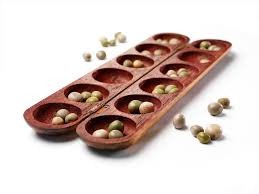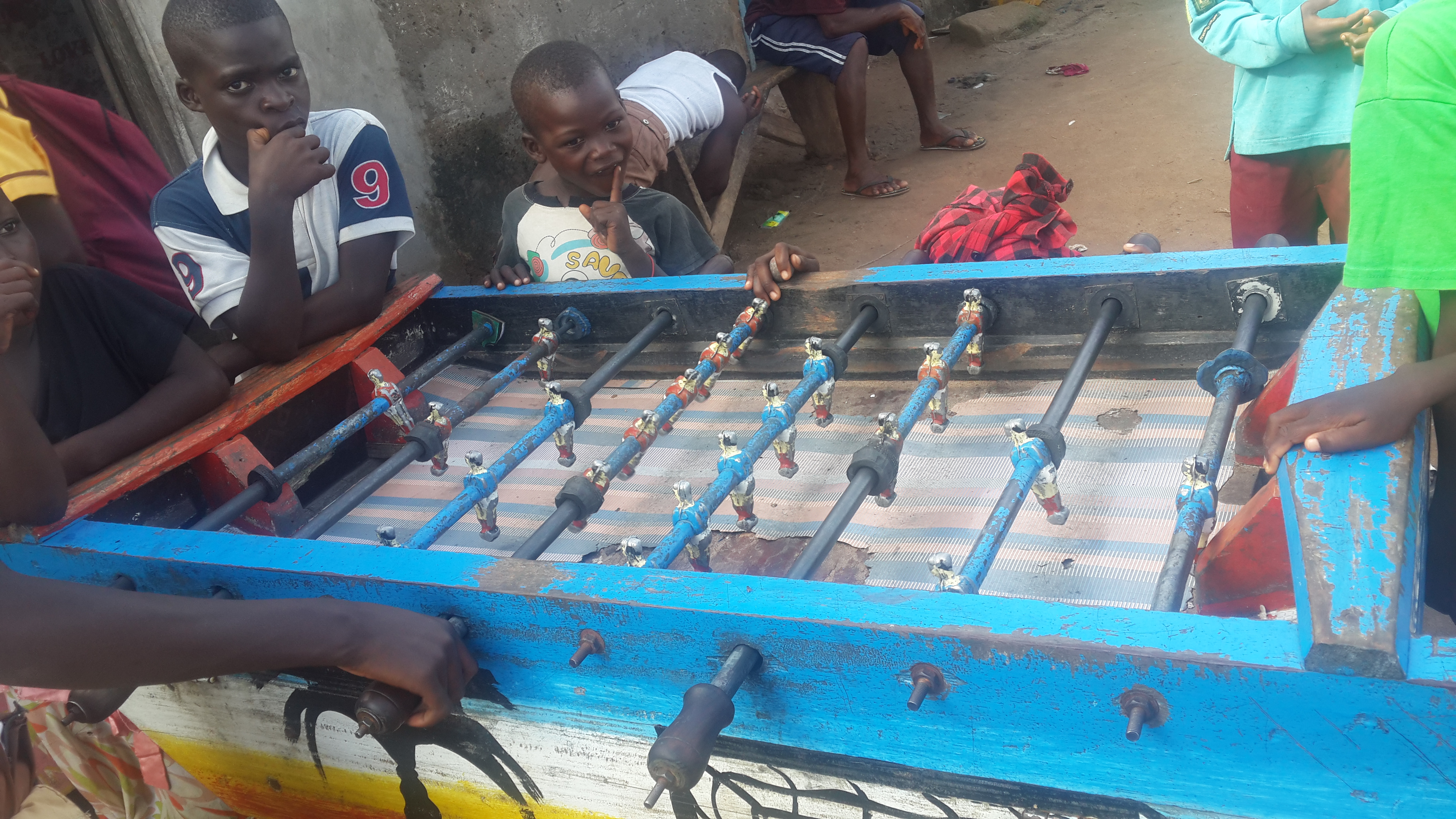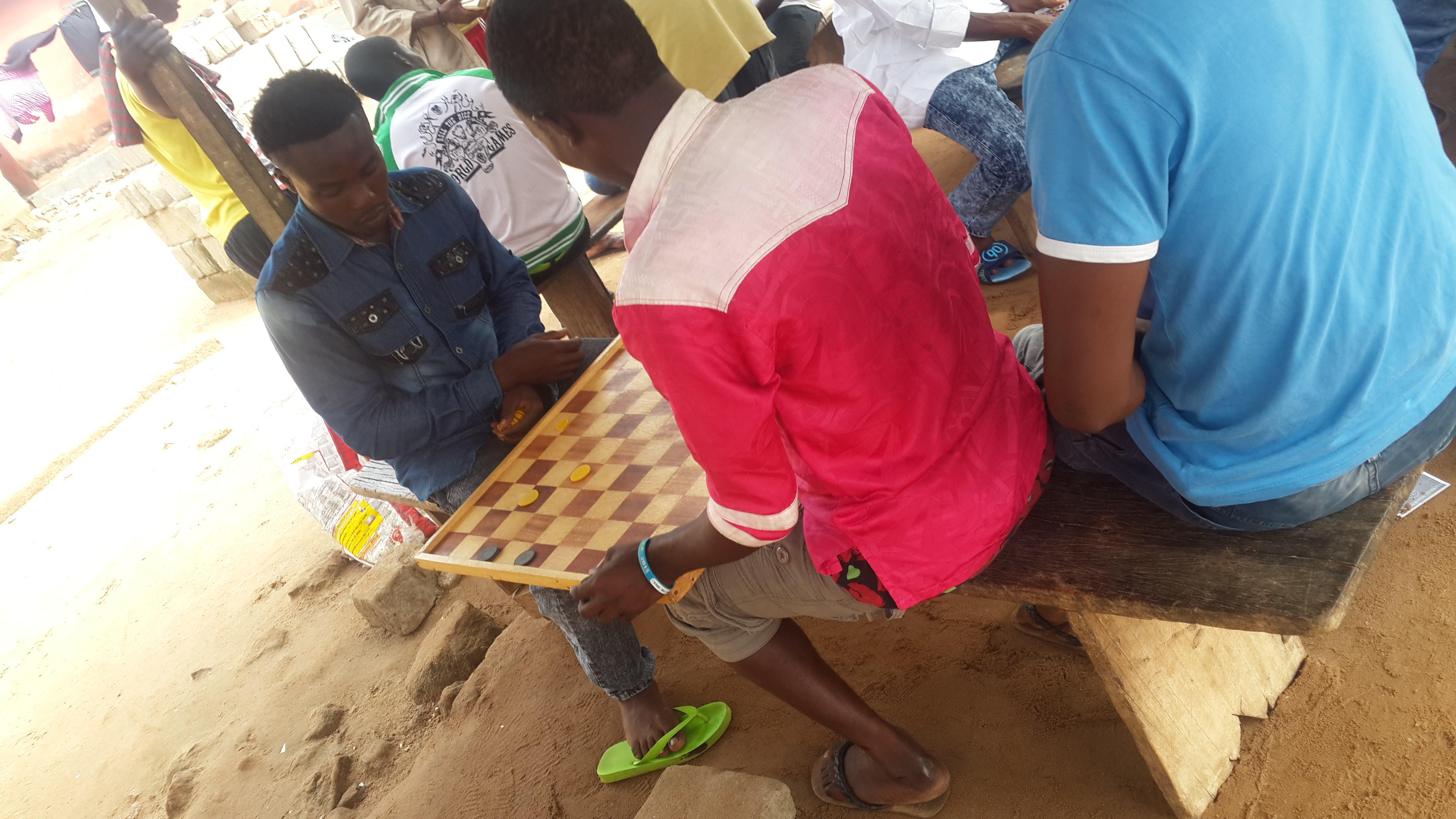OWARE
This game requires an Oware board and 48 seeds or marbles. A typical Oware board has two straight rows of six pits called "houses". Each player controls the six houses on their side of the board. The game begins with four seeds in each of the twelve smaller houses. The object of the game is to capture as many seeds as possible. The first player to capture 25 seeds or more wins the game.
To start the game, both players have to decide who should begin. This could be through mutual agreement or the tossing of a coin. In subsequent games, the winner starts the game. Players do not play simultaneously. A player can pick seeds from any of his six houses in front of him. Once the house has been selected, all the seeds have to be scooped and sown in an anti-clockwise direction, in a consecutive manner placing the first seed in the house of the right of where they were scooped from. The remainder of the seeds, are placed in the houses directly following each other without skipping a house.
This game is played among family members and sometimes friends. It serves as a great means of spending time together after a day’s work as discussions could be going during play. It helps players think critically too.
Source: Wikipedia
SOCCER
Depending on the number of boys available and willing to play, teams are formed, a goalkeeper selected, positions given, and the soccer match begins. This is usually informal and with no referees. As and when a player had to go home due to an errand or any other excuse, substitutions are made, provided there are willing players outside the game. Sometimes, these games are played between communities as a form of entertainment.
This game could be small poles - where there is no goalkeeper usually because there are limited number of players. Here the size of the goalpost is very small and as long as players get the ball into the opponent’s goalpost, they score points. The team with the most number of points wins.
Big poles, however, mimics the standard soccer matches played in tournaments. There is usually a goalkeeper with a relatively bigger goalpost to guard. Players also play their assigned positions.
SPAR
This is one of the popular card games in Ghana. Sometimes it is played for money, but often simply for bragging rights. Spar is usually played by 2 to 7 players. The game uses 35 cards from a standard international 52-card pack.
The first dealer is chosen at random; thereafter the winner of each hand deals the next. The dealer shuffles and deals five cards to each player: a batch of three cards to each player, starting with the player to dealer's left if playing clockwise, and then a batch of two cards each, ending with the dealer.
The next player after the dealer leads any card, playing it face up in the middle of the playing area. The other players in turn must play a card of the same suit if they can; those who have no card of the suit led play any card they choose.
When all have played one card, the first trick is complete. Whoever played the highest card of the suit that the first player led is the winner of the trick. The cards played are not gathered in, but remain in a face up pile. The winner of the trick leads any card from hand to begin the next trick, playing it face up on top of the pile, and once again the other players must each play a card: this must be the same suit as the card that was led if possible, otherwise any card. This continues until five tricks have been played.
If a player wins the last two tricks with sixes, sevens or one of each, both tricks are scored for: 6 points for two sixes; 5 points for a 6 and a 7 in either order; 4 points for two sevens. In this version, the winner adds the amount won to his cumulative score, written on paper.
Some players keep score using stones. Players take a stone for each point scored, and when all the stones have been taken the player with most stones is the winner. In case of a tie, the players play another deal to decide the winner.
GBAGBO (Table Football)
The table usually contains 8 rows of foos men, which maybe plastic, metal, wooden, or sometimes carbon-fibre figures mounted on horizontal metal bars. Each team of 1 or 2 human players controls 4 rows of foos men. Table football can be played by two individuals (singles) – and also with four people (doubles), in which there are teams of two people on either side. In this scenario, one player usually controls the two defensive rows and the other team member uses the midfield and attack rows.
To begin the game, the ball is served through a hole at the side of the table, or simply placed by hand at the feet of a figure in the center of the table. The initial serving side is decided with a coin toss. Players attempt to use figures mounted on rotating bars to kick the ball into the opposing goal. The winner is determined when one team scores a predetermined number of goals, typically five, ten, or eleven in competition.
The youth of Oshiyie usually come together after school to play the Gbagbo. An amount of money is paid to the owner of the game who give the players a number of balls to play with. This determines how many ‘games’ the players can play before they are timed out. Once all the balls are exhausted because the players scored goals, the game ends. Another set of players would now have to pay to start their own session.
Source: Wikipedia
The table usually contains 8 rows of foos men, which maybe plastic, metal, wooden, or sometimes carbon-fibre figures mounted on horizontal metal bars. Each team of 1 or 2 human players controls 4 rows of foos men. Table football can be played by two individuals (singles) – and also with four people (doubles), in which there are teams of two people on either side. In this scenario, one player usually controls the two defensive rows and the other team member uses the midfield and attack rows.
To begin the game, the ball is served through a hole at the side of the table, or simply placed by hand at the feet of a figure in the center of the table. The initial serving side is decided with a coin toss. Players attempt to use figures mounted on rotating bars to kick the ball into the opposing goal. The winner is determined when one team scores a predetermined number of goals, typically five, ten, or eleven in competition.
The youth of Oshiyie usually come together after school to play the Gbagbo. An amount of money is paid to the owner of the game who give the players a number of balls to play with. This determines how many ‘games’ the players can play before they are timed out. Once all the balls are exhausted because the players scored goals, the game ends. Another set of players would now have to pay to start their own session.
Source: Wikipedia
DRAUGHTS
Draughts is played by two opponents, on opposite sides of the game board. One player has the dark pieces; the other has the light pieces. Players alternate turns. A player is not allowed to move an opponent's piece. A move consists of moving a piece diagonally to an adjacent unoccupied square. If the adjacent square contains an opponent's piece, and the square immediately beyond it is vacant, the piece may be captured (and removed from the game) by jumping over it.
Only the dark squares of the checkered board are used. A piece may move only diagonally into an unoccupied square. Capturing is mandatory in most official rules, although some rule variations make capturing optional when presented. The player without pieces remaining, or who cannot move due to being blocked, loses the game.
This is usually played by the young adults and older men in the community. It is either played for money or for the bragging rights that comes along with a victory. During these game session, matters of interest are discussed, ranging from sports, to politics, entertainment and so on. These usually break out into friendly arguments but could sometimes get ugly.
Source: Wikipedia
OTHERS
Family and friends sit around and spend time together talking about topics of interest. They also help one another with household chores and support each other.





